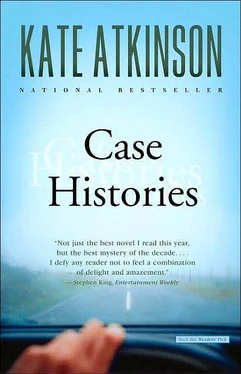"Can I get you a drink, sir?" He opened his eyes and looked into Nicola Spencer's bland, indifferent face. She smiled at him without warmth and repeated her question. He asked for an orange juice in order to prolong the encounter a little. In some ways he knew everything about Nicola Spencer, and in other ways he knew absolutely nothing. She gave him a small packet of pretzels with his orange juice and moved on to the next passenger. He watched as she pushed her trolley past him, her muscular buttocks straining against her uniform skirt. He thought about following her when they landed – out of curiosity and because she was unfinished business – but by the time he'd gone through the rigmarole of picking up a rental car at Toulouse Airport, he'd lost interest.
Jonathan said, "What do you want for your birthday?" and she said, "A Mercedes SL 500," joking, obviously, and he said, "Any particular color?" and she said, "Silver," and fuck me (she thought) if it wasn't sitting there in the driveway, seventy thousand quid's worth, tied with a big, pink ribbon. He must be even richer than she thought. She had no idea how much money he had, she didn't want any of his money, she hadn't even wanted the car, not really, although now that she had it she loved it. Two seats, no room in the back for dogs or kids.
"Goodness," Rowena said when she saw it. It was amazing how much meaning you could pack into one two-syllable word.
Maybe the car was a farewell gift. Maybe he was getting ready for his next wife. She was pretty sure he had someone in London. She'd be surprised if he didn't, men like Jonathan always had mistresses. They never married them though. She should have been a mistress – temperamentally she was much better suited to being a mistress than a wife.
They still didn't know about the baby, safe inside her. She was getting ready to shed her skin again, grow another new one. She had to leave before she got stuck in inertia, before someone discovered her. Before they stopped her when they found out about the baby. They would want to get their hands on the baby. And it was a shame because she really loved the school and the job, but there were other schools and other jobs, everything was possible when you turned your mind to it. And she was taking the baby with her (obviously) out of this place because it wouldn't be a good environment for it – it might grow up speaking French on Wednesdays and not understanding about love. She ached with love for this baby. That was something that no one in this house was capable of understanding. There was a time when she hadn't been capable of understanding love, and what a mess that had made of everything. She'd said to Shirley, "Treat me as if I'm dead," but she hadn't expected her to actually do as she said. But there'd been nothing: no visits, no cards, no birthday gifts, no word at all. For months she waited for Shirley to turn up on visiting day, with Tanya in her arms (Look, here's Mummy), or chaperone their useless parents (Come on, you have to visit Michelle), but no. All her letters went unanswered, all her hopes were knocked back until she came to think maybe it really was for the best. Let them get on with their lives, let them be free of her, because what good had she ever done them? She hadn't loved the people that she'd had a duty to love, and you had to pay the price for that, sooner or later.
When you left you didn't leave any traces. You packed minimally, you walked out as if you were going to Leeds for the day (but you took the beautiful car). You didn't leave evidence, you didn't place your fingerprints all over the handle of the bloody ax to protect other people. This time she was taking the bug, the new bug, and she would love this baby so much that it would wake up every day in a state of bliss and she herself would be in a state of grace, at last. She would have to stop living her life as one variation after another on a pastoral theme, she would have to think of something absolutely different to do next time. She should probably move abroad – Italy or France. Of course you could never move far enough – Patagonia, China – nowhere was far enough, but the trick was to keep moving. The trick was not to leave the bug behind. And one thing was certain: you could never go back.
She was going to give him a chance to come with her, just one chance: He was going to be shocked and he wouldn't come, but he was going to get that chance.
He was on his bicycle (with bicycle clips – for heaven's sake – around the ankles of his cheap, black trousers), and he looked round when he heard the car approaching. She had the top down, and when she drew level she stopped and he dismounted and laughed and said, "That's one snazzy set of wheels, Mrs. Weaver," as if he were a secondhand car dealer, and she said, "Sure is, Vicar," and she patted the seat beside her and said, "Do you want to come for a ride?" and he made some kind of helpless gesture toward the bike but then said, "Oh, what the…" and lay the bike down in the long grass of the verge. But when he put his hand on the door handle, she reached over as if to stop him and said, "But I have to tell you, I'm going to drive off and I'm not coming back, not here, not ever, and when I leave I'm going fast," and he said, "You're not joking, are you?" and she thought how she loved the way he looked like a solemn little boy when he was trying to think of the right answer to something. She revved the engine and said, "I'm going to count to ten…"
Chapter 23. CASE HISTORY NO. 3 1979
Everything from Duty, Nothing from Love
Michelle thought that she'd been angry before, but never like this. It was like being a volcano, plugged and stoppered and unable to get rid of the boiling stuff inside. Which was called – what? Magma? Lava, for fuck's sake. She couldn't even remember the simplest words anymore. "Maternal amnesia," the books said, but if it was amnesia then it was very selective; it didn't allow her to forget how completely miserable and unhappy she was, did it? And today had been going really well up until this moment – she'd been on top of everything, everything under control, and then he'd barged into the house without a second thought and woken the baby up.
Michelle tugged at the ax, but it was stuck like bloody Excalibur in the log, and she was so lost in her fury that she didn't hear Shirley and when she turned round and saw her she nearly jumped out of her skin and said, "Jesus, you frightened me," and just for a nanosecond in time she forgot how angry she was but then she heard the baby screaming inside the house – half of East Anglia must be able to hear the bloody baby – and it all came boiling up again and she knew this time it was going to blow and it was going to be a mess. Krakatau. You see, she could still remember some things. "You look like you're going to kill someone with that ax," Shirley said, laughing, and Michelle said, "I am."
She charged through the back door like a Viking berserker and when Keith saw her he laughed as well. They were all fucking laughing at her as if nothing she said was important, as if she didn't mean what she said, and she lifted up the ax, although it was awkward because she didn't really understand where its center of gravity was, and she flung it at Keith, but it was a girly throw and the ax bounced heavily and landed harmlessly on the floor.
He was furious, he was even more angry than she was, and at first she thought it was just because of the ax, although it was miles away from him, but then she realized he was shouting about Tanya. "You might have hit her, you might have really hurt her," and she said, "Don't be ridiculous. It was nowhere near her," and he yelled, "You crazy fucking bitch, that's not the point," and she felt suddenly frightened because she could see that Keith had lost it now – he didn't even look like himself and he made a move to pick up the ax but the next moment it was in Shirley's hands and she didn't do any girly tossing. She just lifted the whole weight of the ax up and brought the blade down on Keith's head and then everyone was quiet, even the bug.
Читать дальше

![Дорис Лессинг - Заметки к истории болезни [Notes for a Case History ru/en]](/books/232730/doris-lessing-zametki-k-istorii-bolezni-notes-for-thumb.webp)










